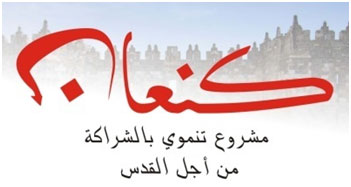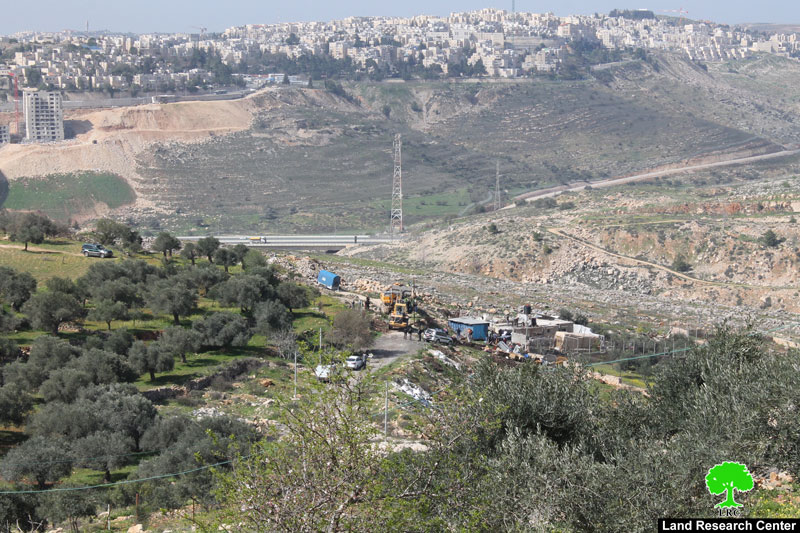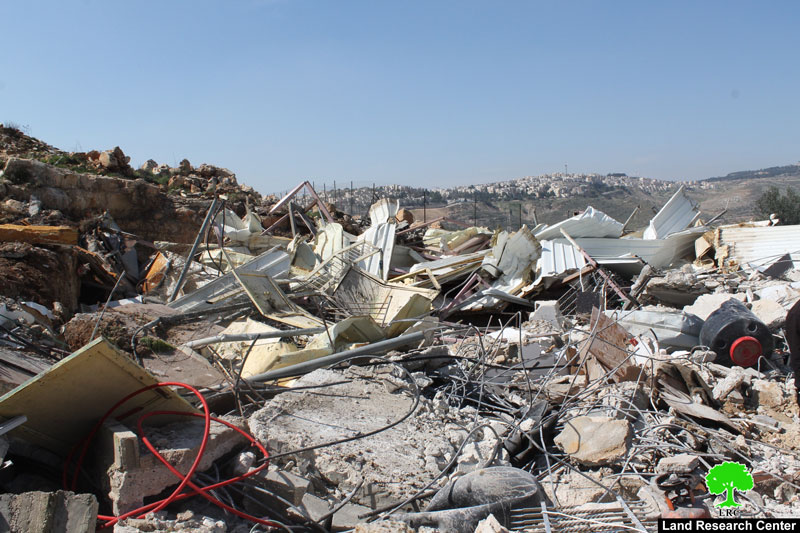2018-07-17
The Israeli Occupation Authorities Demolish a House and a Cattle Shelter in Shufat
For the second time, the Israeli occupation authorities destroy a residence and a cattle shelter in Shu'fat, in the north part of the Occupied City of Jerusalem, under the pretext of unauthorized construction.
On Tuesday morning of 17 July, 2018, Israeli police forces with a bulldozer broke into the town and headed to Saleh Abukhdair's place, opposite to Ramat Shlomo settlement. The bulldozer then started leveling Abukhdair's residence and cattle shelter.
Saleh Saeed AbuKhdair told Land Research Centre that:
At the beginning of this year, specifically on February 21, 2018, Israeli bulldozers demolished my house under the pretext of building without a permit. The area of the house was 115m2 in addition to the 50m2 sheep shelter. Myself and my six family members, including 1 child, got displaced. Then soon after, we embarked on building a new place. The house is under construction and has an area of 102 m2 and is built of bricks. It consists of 3 rooms, a living room, a kitchen and a bathroom. We also built a shelter for the sheep on a 50m2 area.
AbuKhdair added,
On the morning of July 17, without any prior warning or notice, some staff from the Israeli occupation municipality accompanied with a number of Israeli police officers and a bulldozer arrived to the area. They closed the road leading to the house and prevented anyone from reaching the area. Then the bulldozer from the municipality started demolishing the house and the shelter until it destroyed them completely.
The municipality of the Israeli occupation works tirelessly to prevent any construction of any building in this area, which is considered the future borders of the settlement of Ramat Shlomo and therefore plans to expand the settlement at the expense of the land of the people of the town. In fact, Ramat Shlomo was illegally built on Shu'fat lands. Plus, the Israeli municipality does not include the area under any planning scheme so to deprive its owners from any future plans regarding their la
International Conventions and agreements pertaining to house demolition:
The Universal Declaration of Human Rights:
Article 17: " (1) Everyone has the right to own property alone as well as in association with others.
(2) No one shall be arbitrarily deprived of his property."
The 1907 the Hague Convention
Article 23: " In addition to the prohibitions provided by special Conventions, it is especially forbidden to destroy or seize the enemy's property, unless such destruction or seizure be imperatively demanded by the necessities of war."
The Geneva Fourth convention
Article 53: " Any destruction by the Occupying Power of real or personal property belonging individually or collectively to private persons, or to the State, or to other public authorities, or to social or cooperative organizations, is prohibited, except where such destruction is rendered absolutely necessary by military operations."
The International Covenant on Economic, Social and Cultural Rights:
Article 11.1 states: "The States Parties to the present Covenant recognize the right of everyone to an adequate standard of living for himself and his family, including adequate food, clothing and housing, and to the continuous improvement of living conditions. The States Parties will take appropriate steps to ensure the realization of this right, recognizing to this effect the essential importance of international co-operation based on free consent".
The International Covenant on Civil and Political Rights:
Article 1 states: "1. All peoples have the right of self-determination. By virtue of that right they freely determine their political status and freely pursue their economic, social and cultural development.
2. All peoples may, for their own ends, freely dispose of their natural wealth and resources without prejudice to any obligations arising out of international economic co-operation, based upon the principle of mutual benefit, and international law. In no case may a people be deprived of its own means of subsistence.
3. The States Parties to the present Covenant, including those having responsibility for the administration of Non-Self-Governing and Trust Territories, shall promote the realization of the right of self-determination, and shall respect that right, in conformity with the provisions of the Charter of the United Nations."
This case study is part of Kan'aan Project



